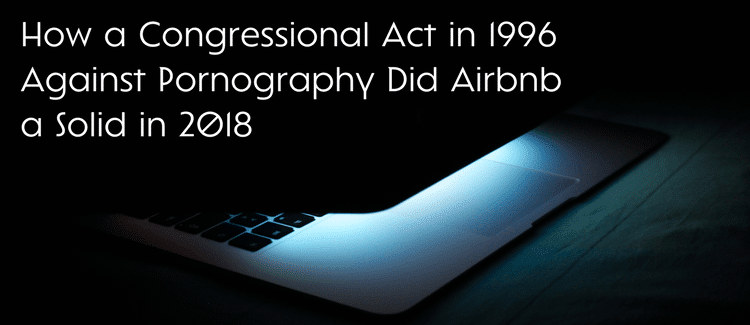How a Congressional Act in 1996 Against Pornography Did Airbnb a Solid in 2018
Airbnb is a platform designed for people seeking affordable, high quality, and immersive travels. Airbnb has gained popularity by providing business opportunities to homeowners, unique experiences to guests, and increased tourism for communities, but it has also become hated for the many side effects and headaches it can bring to guests, hosts, and neighbors. These negative and often unforeseen consequences Airbnb brings have become known as the “Airbnb Effect” and have prompted municipalities, corporations, and individuals to take action through media outlets and legal methods.

Two weeks ago, U.S. District Court Judge Dolly Gee dismissed a lawsuit brought by Aimco, the largest landlord in the country, against Airbnb. Aimco claimed Airbnb was “deliberately incentivizing people to breach their leases” by providing a platform through which tenants could sublease their apartments without Aimco’s authorization. In response to this allegation, Airbnb argued that Aimco’s request to ban subleasing through their platform was not enforceable under several California state laws and the Communications Decency Act of 1996 (“CDA”).
Communications Act of 1996 as it relates to Airbnb
The CDA was the government’s first real attempt through Congress to regulate pornographic material on the internet. Section 230 of the CDA, as interpreted later by multiple courts, has been interpreted to say that internet service operators are not necessarily publishers and therefore not legally liable for the words or actions of third parties who use their services. For example, under the CDA, Google or any other search engine would not be responsible for directing a user to any pornographic or otherwise illegal websites because they merely host content.
The U.S. District Court decision
At trial, Aimco argued that Airbnb acted as an information content provider of the lease-breaking listings and was thus legally responsible for such activity. Judge Dolly Gee, however, concluded that Airbnb is not an information content provider, but rather an internet host under her interpretation of Section 230 of the CDA. In her 13-page ruling, she states, “Airbnb hosts – not Airbnb – are responsible for providing the actual listing information. Airbnb ‘merely provide[s] a framework that could be utilized for proper or improper purposes.’” Under this ruling, Airbnb will not automatically be liable for illegal activity conducted by third-party hosts or guests who use the platform, as long as it is a mere facilitator of the content and interactions. As strange as it sounds, a 1996 congressional act against pornography really helped Airbnb in a case against an apartment homes empire.
What does this ruling mean for me?
As a landlord, property manager, or homeowners’ association trying to avoid the “Airbnb Effect,” this ruling might be very frustrating. While a California District Court ruling is not binding in Arizona, it is influential and suggests that enforcing contractual subleasing restrictions will continue to be difficult for landlords. After all, Airbnb won’t even let landlords know which tenants are subleasing. At the same time, it would be an impossible task for Airbnb to determine when subleases are or aren’t allowed under a tenant’s lease agreement. Depending on how the Ninth Circuit treats this case on appeal (assuming that it is appealed), landowners, property managers, and homeowners’ associations may feel pressured to gain some revenue by giving into the “Airbnb Effect” and joining the Airbnb Friendly Buildings Program. It is important to remember that tenants who sublease property in violation of their leasing agreement with a landlord, are still violating their lease agreements under this recent ruling. However, Airbnb will probably not disclose your participation to your landlord and your landlord will not have a one-click mechanism for determining which tenants are subleasing through Airbnb.
After reading this article, you may want advice on how your short-term rental listing or potential listing might violate Arizona law. The controversies surrounding these listings are new and always changing, but an experienced real estate attorney or business attorney can examine your unique circumstances and help you get the answers you need to make an informed decision.
Approved By:

1930 N Arboleda #200
Mesa, AZ 85213
Office: 480-325-9900
Email: [email protected]
Website: dentonpeterson.com